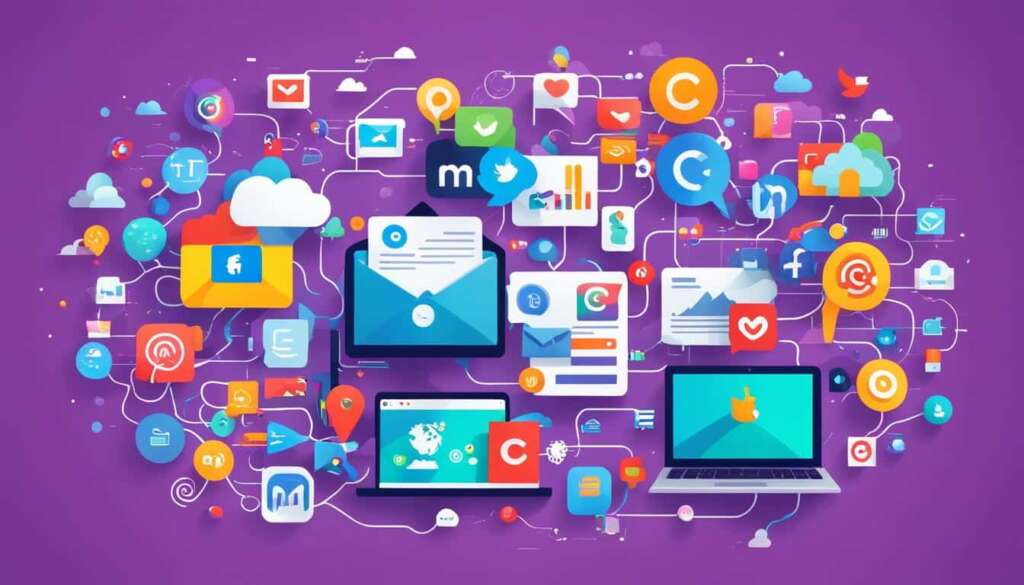Table of Contents
Digital marketing has revolutionized the way businesses promote and sell their products and services online. In today’s digital age, companies leverage websites, apps, social media platforms, search engines, and other digital channels to reach their target audiences effectively.
While digital marketing shares many principles with traditional marketing, it comes with its own set of unique challenges. Companies often combine traditional and digital marketing techniques in their strategies to maximize their reach and engagement.
The effectiveness of digital marketing campaigns can be measured using various tools, such as click-through rate and conversion rate. However, one of the biggest hurdles faced by digital marketers is how to stand out in a world oversaturated with digital ads and other distractions.
As technology continues to evolve, so do the strategies and techniques used in digital marketing. It is crucial for businesses to stay up-to-date with the latest trends and optimize their online presence to stay competitive in today’s digital landscape.
In the upcoming sections, we will dive deeper into how digital marketing works and explore the different types of digital marketing channels. By understanding these concepts, businesses can enhance their online marketing efforts and drive meaningful results.
How Digital Marketing Works
Marketing encompasses a wide range of techniques and media that companies can use to promote their products and services. In the digital age, companies have embraced digital marketing as a powerful tool to reach consumers and gather valuable user data. With the advent of the internet, companies began to shift their focus from traditional marketing channels like print, television, and radio to online platforms that provided a more direct and interactive way to connect with their target audience.
Early on in the digital marketing era, email marketing and search engine optimization emerged as popular techniques for reaching consumers. Email marketing allowed companies to directly engage with customers through personalized messages, while search engine optimization ensured that their websites appeared prominently in search engine results.
“Digital marketing has revolutionized the way companies advertise and sell their products. It has provided marketers with new tools and strategies to target consumers more effectively.”
However, the true power of digital marketing came with the rise of social media platforms. These platforms offered companies the ability to track user data and deliver targeted messages based on user preferences and behaviors. This shift allowed for more personalized and relevant advertising, increasing the effectiveness of marketing campaigns.
Furthermore, the widespread adoption of smartphones and other portable devices has made digital marketing even more accessible. Consumers now have the power to make online purchases using their phones, leading to a significant increase in mobile commerce. This trend has forced digital marketers to adapt their strategies to cater to the mobile audience, ensuring a seamless and user-friendly experience for potential customers.
Digital marketing also allows for interactive experiences, engaging consumers in ways that traditional advertising methods cannot. With features like live chats, quizzes, and personalized recommendations, companies can create immersive marketing experiences that capture consumers’ attention and drive sales. The interactive nature of digital marketing fosters a deeper level of engagement and connection between brands and their audience.
Types of Digital Marketing Channels
Digital marketing channels have evolved since the 1990s. One of the most essential channels is website marketing, which involves using a company’s own website as the centerpiece of their digital marketing activities. A well-designed and user-friendly website can attract potential customers and drive conversions.
Pay-per-click advertising is another popular channel that allows marketers to reach audiences through paid ads on various platforms. With pay-per-click advertising, companies can target specific demographics and only pay when someone clicks on their ad, making it a cost-effective option for many businesses.
Content marketing is all about creating valuable and relevant content to attract potential customers. This can be done through written articles, visual graphics, or engaging videos. By providing useful information and demonstrating expertise, companies can build trust and establish themselves as industry leaders.
Email marketing remains one of the most effective digital marketing channels. By sending targeted and personalized emails to their subscriber list, companies can nurture leads and drive conversions. Email marketing allows for direct communication with customers, making it a powerful tool in any digital marketing strategy.
Social media marketing focuses on building brand awareness, engaging with customers, and establishing trust through social media platforms such as Facebook, Instagram, and Twitter. By creating compelling content and interacting with followers, companies can increase their reach and connect with their target audience.
Affiliate marketing involves partnering with other businesses to promote their products or services. Companies earn a commission on each sale made through their affiliate links. This channel is advantageous because it allows businesses to expand their reach by leveraging existing networks and trusted influencers.
Video marketing has gained significant popularity in recent years. Platforms like YouTube provide an opportunity for companies to run video marketing campaigns, showcasing their products, sharing tutorials, or creating entertaining content. Videos can be engaging and memorable, making them a powerful tool for capturing audience attention.
Lastly, text messaging is a channel that companies use to send information about their latest products, promotions, or updates directly to their customers’ phones. This form of marketing is highly effective as it reaches customers instantly and has a high open rate.
Overall, leveraging various digital marketing channels allows companies to create a comprehensive and effective marketing strategy, reaching their target audience through multiple touchpoints and maximizing their chances of success.
FAQ
What is digital marketing?
Digital marketing refers to the use of websites, apps, social media, search engines, and other digital means to promote and sell products and services.
How does digital marketing work?
Digital marketing involves using various marketing techniques and media to reach and engage with consumers. It leverages the internet and digital platforms to connect with the target audience, gather user data, and deliver targeted messages.
What are the challenges of digital marketing?
Digital marketing comes with its own set of challenges, such as standing out in a world oversaturated with digital ads and other distractions. Marketers need to find innovative ways to capture the attention of consumers and drive conversions.
How effective are digital marketing campaigns?
Digital marketers have various tools to measure the effectiveness of their campaigns, including click-through rate and conversion rate. By tracking these metrics, marketers can optimize their strategies and improve results.
How does digital marketing differ from traditional marketing?
While digital marketing shares fundamental principles with traditional marketing, it utilizes digital means and platforms to reach and engage with the target audience. Digital marketing enables more targeted campaigns, real-time tracking, and interactive experiences for consumers.
What are the different types of digital marketing channels?
Digital marketing channels include website marketing, pay-per-click advertising, content marketing, email marketing, social media marketing, affiliate marketing, video marketing, and text messaging. Each channel offers unique ways to connect with consumers and promote products or services.













